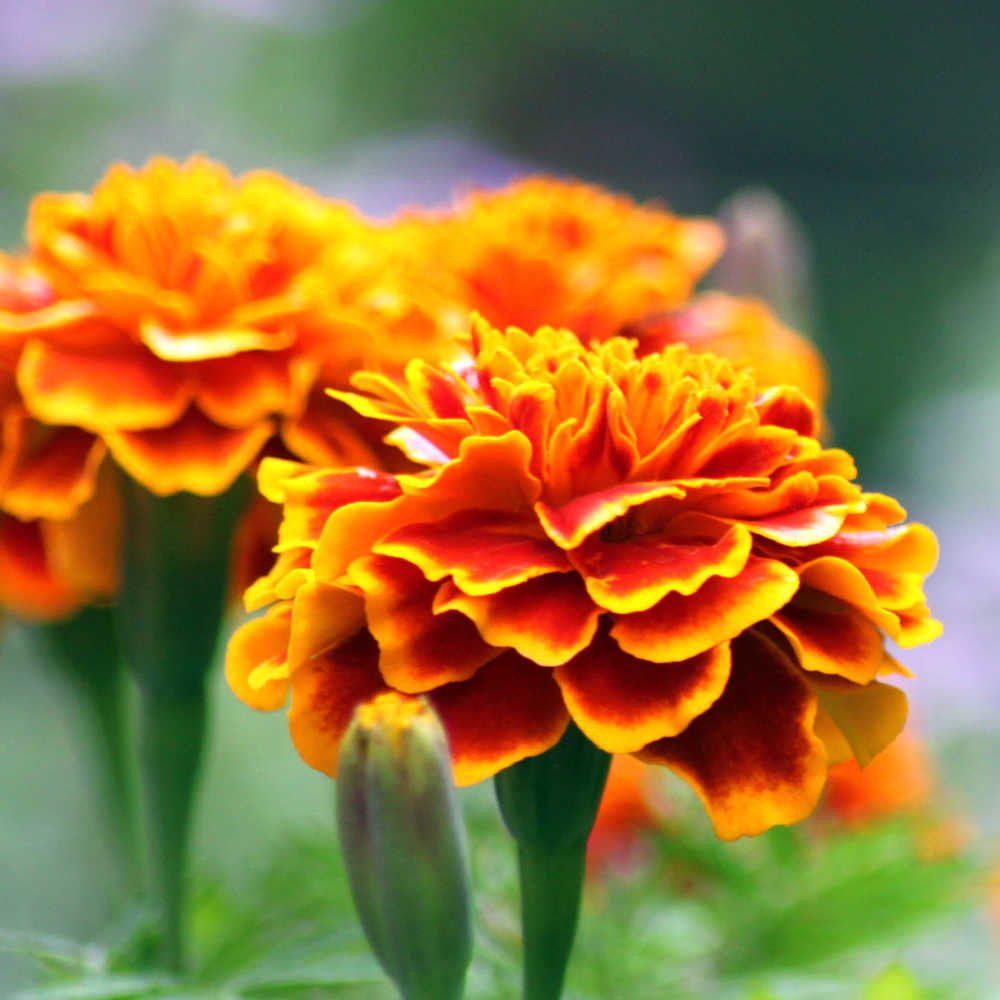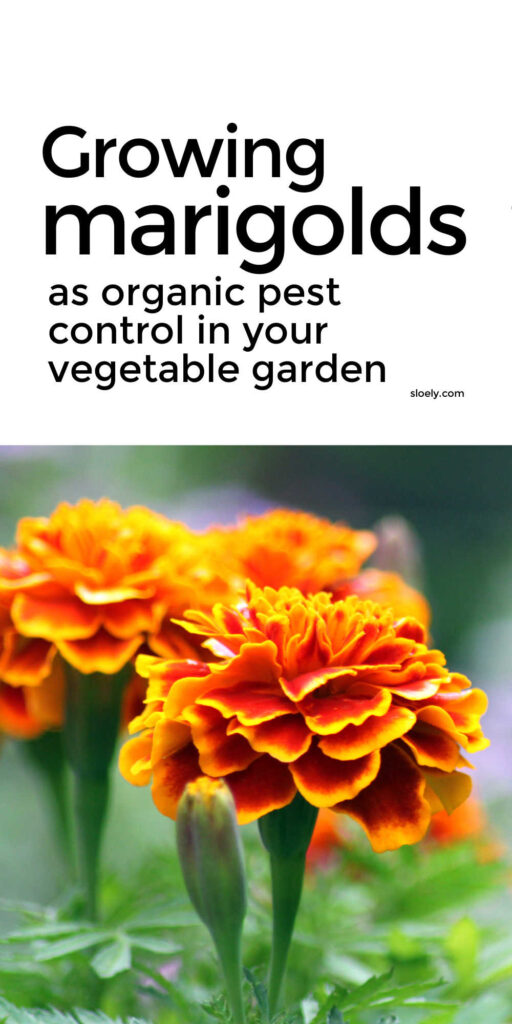
Growing marigolds to control pests is a must if you want to start gardening organically or if you just want some incredibly pretty flowers that keep all sort of pests from eating your vegetables.
Marigolds have been grown as natural pest control in vegetable gardens for centuries and they really are a pest control power house. They are even a natural mosquito repellent.
So even if you're a new gardener and don't want to get into complicated companion planting you do want to grow marigolds.
And in this post I will take you through everything you need to know about growing marigolds to control pests organically without toxic pesticides. I'll start with the benefits of marigolds for organic pest control and then go through how to grow marigolds successfully.
Table of Contents
How Marigolds Control Pests Organically
Marigolds - along with garlic and chives - are one of the most useful companion plants in your vegetable garden as they can control all sorts of pest organically in all sorts of different ways.
We can use marigolds to:
- Repel vegetable eating insects
- Camouflage vegetables from pests
- Keep pests off prize vegetables as a trap crop
- Attract pest predators
- Kill disease spreading nematodes.
We can also use pretty marigolds to attract pollinators all summer long.
Using Marigolds To Repel Pests
The fragrance of marigolds naturally repels key pests including white fly, butterflies and moths whose caterpillars devour cabbages and collard greens and some beetles.
Marigolds As Camouflage
Marigolds - like garlic and chives - can be used as camouflage to hide vegetables such as carrots from key pests. The strong fragrance of the marigolds prevents the dreaded carrot fly from picking up the gentler smell of the carrots.
Marigolds As A Trap Crop
Marigolds can also be used as a sacrificial trap crop for slugs and snails who will eat the marigolds rather than your vegetables. As you can cram marigolds in a bit you can easily afford to lose a few.
Attracting Pest Predators With Marigolds
Attracting natural pest predators - such as ladybirds, lacewings & hover flies - into the garden is essential for successful organic gardening.
The bright orange flowers of the marigolds are great for attracting these predators who will control pests organically by eating all sorts of aphids and mites.
Using Marigolds To Kill Nematodes
Nematodes are a worm like bug that can cause disease in a range of vegetables including tomatoes, lettuce, carrots, peppers & potatoes.
Now not all nematodes are bad news for us gardeners. Some nematodes can actually be used for organic pest control themselves.
But we can use marigolds to control nematodes causing problems organically as marigolds secrete a chemical into the soil which is toxic for nematodes. Although, they only do this 12 weeks or so after planting so will not give immediate protection to early spring vegetables.
Attracting Pollinators With Marigolds
Flowering and fruiting vegetables such as tomatoes, peas and zucchini all need plenty of pollinators in our gardens.
But sadly too many pesticides have actually reduced the numbers of bees, butterflies, ladybugs, lacewings and hover flies buzzing around in our backyards.
Planting marigolds that will keep flowering all summer long throughout our garden is a great way to attract all these pollinators back again.
Now we've seen all the amazing benefits of growing marigolds for organic pest control let's move on to how to grow marigolds.

Different Marigold Varieties
The first thing we need to know about growing marigolds is that there are different varieties.
- French marigolds (Tagetes patula)
- African or American marigolds (Tagetes erecta)
- And pot marigolds (Calendula officinalis) which aren't actually marigolds at all!!

Now the marigolds we are interested in as companion plants for organic pest are the French marigolds as they are the ones that have all of those amazing organic pest control benefits.
The other marigolds are lovely but won't do the trick.
Growing Marigolds From Seed
Marigolds can be grown easily from their rather wonderful seed.
Ideal growing conditions for different varieties of French marigold seed do vary, so you do need to check seed packet details before buying and sowing.
When To Plant Marigolds
French marigolds are annuals and don't like the frost so you can't sow marigold seeds outside until after your last frost date.
Marigold seeds will also germinate and grow better in warmer temperatures around 65 degrees fahrenheit / 18 degrees centigrade so in climates such as the UK where it doesn't warm up very quickly after the last frost date you may need to wait into May to sow seeds outdoors.
That's all a bit late for pest control duties in the vegetable garden!!
So if you are growing marigolds as organic pest control you really want to start them off indoors or under cover. Start sowing marigold seeds indoors 6 weeks or so before you will typically hit average temperatures of 18 degrees.
Best Conditions To Grow Marigolds In
Marigolds aren't particularly fussy about soil conditions and will grow happily in typical potting compost and reasonably well drained soil.
How To Sow Marigold Seeds
Sow marigold seeds about 1cm / half an inch deep and about 2 or 3 cm / 1 inch apart. Seedlings can be thinned later.
When To Transplant Marigolds
If you've got the space indoors or in a little green house hold off transplanting your marigold seedlings until the weather has warmed up and dried out a bit.
In the UK this is typically May but play it by ear and if the weather warms up earlier get them outside in the sunshine because they love it.
It is easier to be flexible with your marigolds if you grow them in pots.
How To Grow Marigolds In Pots
I am a big fan of growing companion plants such as marigolds, garlic and chives in pots so you can easily move them around to do pest control duty in different parts of the vegetable garden as needed.
French marigolds only grow to 20cm or so so they can be grown individually in small 15cm / 6 inch pots which you can spread around near different vegetables.
But marigolds do also look wonderful in a big pot if you're growing vegetables in containers on a patio. You can fill a 45 cm / 18 inch pot with 5 or so French marigold plants.
Where To Plant Marigolds In Your Vegetable Garden
To get the full benefit of their organic pest control powers you need to plant marigolds in a range of places in your vegetable garden.
- Planting marigolds around the perimeter of your vegetables can help repel pests generally and act as a trap crop for slugs and snails who will hit the marigolds first and not bother with anything else.
- To camouflage your carrots you really need to interplant marigolds so the marigold fragrance fully hides the carrots from the carrot fly.
- Marigolds do need to be planted in the same soil - i.e. not in nearby pots - as as tomatoes and lettuces for these plants to benefit from the marigold's organic nematode killing abilities.
But when planting marigolds in the vegetable garden we do also need to think about the marigolds need for full sun.
Do Marigolds Always Need Full Sun?
In general French marigolds will thrive better in full sun not least because they don't like soggy roots. Now obviously that is a problem for some of our vegetables who prefer some shade as the summer heats up.
But by growing at least some of our marigolds in pots we can get round this paradox. When your marigolds first go out around May put them in the sunniest spot you've got to get them flourishing.
And then move the pots or transplant some of the plants later in June to support vegetables who want more shade.
What Marigolds Should Not Be Planted Near
Most helpful companion plants have some vegetables they just don't get on with. Don't plant garlic and chives near peas for example.
But as far as I am aware you can grow marigolds with everything without ill effect. They really are that useful.
How To Keep Marigolds Flowering
If you deadhead your marigold flowers as soon as they start to fade, you can keep your marigolds flowering and doing their work attracting pollinators and pest predators all summer long.
Do Marigolds Come Back Every Year?
French marigolds are annuals so they do not come back every year and you will need to sow them again. But if at the end of the summer you let the flowers go to seed rather than deadheading them you can collect the seeds to plant next year.
And there you go, everything you need to know about growing marigolds to control pests organically. They really are one of the most hard working companion plants we can find and their great splash of gold and orange is a joy to see in the vegetable garden. So do give them a go this year.
For more simple organic gardening advice check out these posts:
- Organic gardening tips for beginners
- Organic weed control
- Cat repellent plants & herbs
- Get rid of slugs & snails naturally
Original image source: main image








Leave a Reply